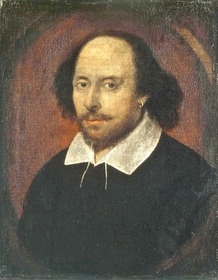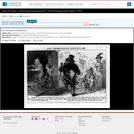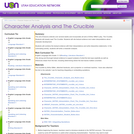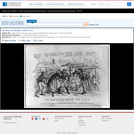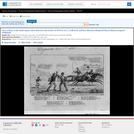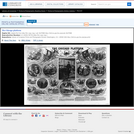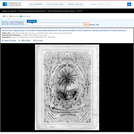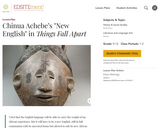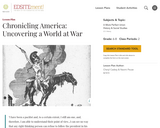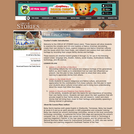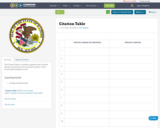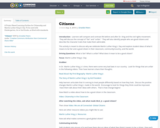Confederate president Jefferson Davis's capture by Union cavalry on May 10, 1865, while allegedly fleeing in women's clothing, inspired a rash of prints exploiting the tale's comic possibilities. According to Davis's autobiography, at the time of his capture he was wearing his wife's raglan overcoat, which he had mistakenly put on in his haste to leave, and a shawl, which his wife had thrown over his head and shoulders. The Northern press made the most of his "last shift," transforming the shawl to a bonnet, and sometimes even portraying Davis wearing a hoopskirt and full female dress. Since Davis had apparently tried to escape casually with a black servant carrying water, he was often pictured carrying a water bucket. Another detail added by the cartoonists was a Bowie knife. Here the artist shows a camp in the woods where Davis, wearing a dress, shawl, and bonnet, and carrying a water bucket labeled "Mom Davis" and a Bowie knife, is accosted by Union soldiers. One Union soldier (center) lifts Davis's skirt with his saber mocking, "Well, "old mother," boots and whiskers hardly belong to a high-toned Southern lady." Davis implores, "I only wish to be let alone." At right another soldier, speaking in a Germanic accent, says, "Mein Gott, ter "olt mutter" vears ter pig gavalrie poots! . . . " He may be intended to represent the Norwegian-born tanner who first spotted Davis. The soldier at left exclaims, "Jerusalem! her "old Mother," hey! Its ld "Leach'" in petticoats--That's so." Behind Davis a woman warns, "Do not provoke tĚ_Ąhe President,' he might hurt some one." A black youth, presumably Davis's servant, looks on, exclaiming, "Golly Marse Yank, de old Missus is "done gone" shu-ah! . . ." At far right a waiting Confederate carriage containing barrels of "Whiskey" and "Stolen Gold" is visible. This impression was deposited for copyright on June 5, 1865, less than a month after Davis's capture. |Entered . . . 1865 by Oscar H. Harpel, (Opera House, Cincinnati) Ohio.|Signed: Design by Burgoo Zac|Title appears as it is written on the item.|"The Confederate Image," p. 85.|Weitenkampf, p. 150.|Forms part of: American cartoon print filing series (Library of Congress)|Published in: American political prints, 1766-1876 / Bernard F. Reilly. Boston : G.K. Hall, 1991, entry 1865-11.

